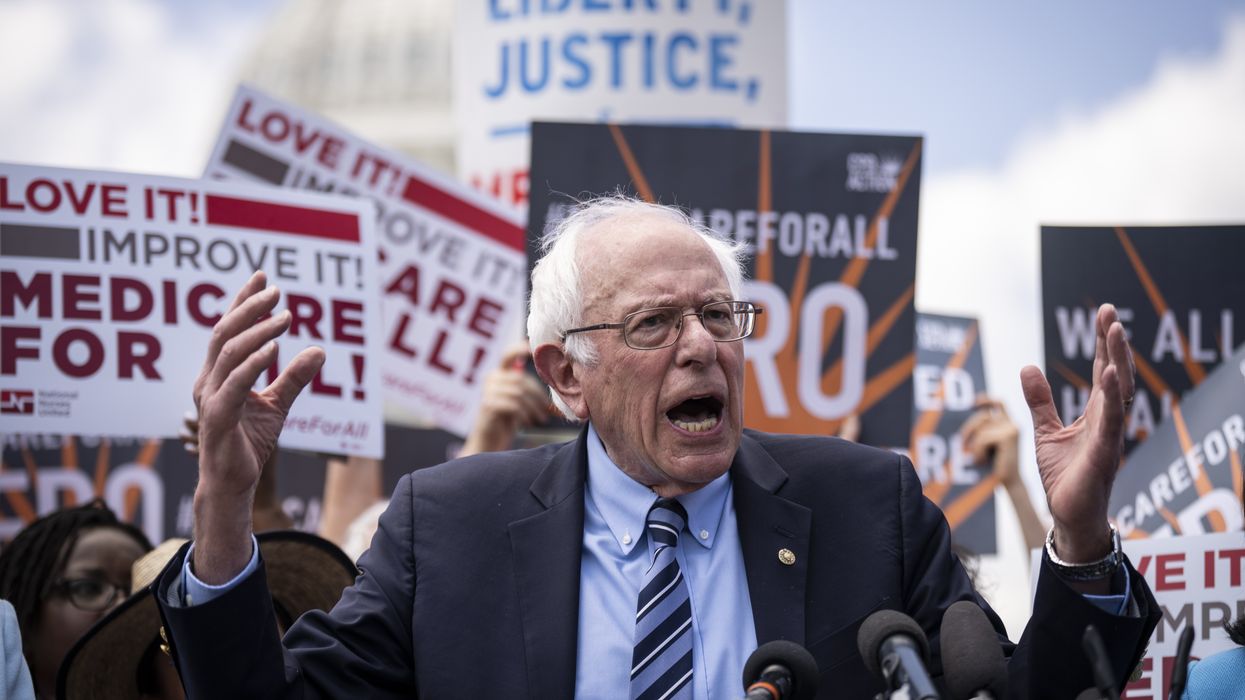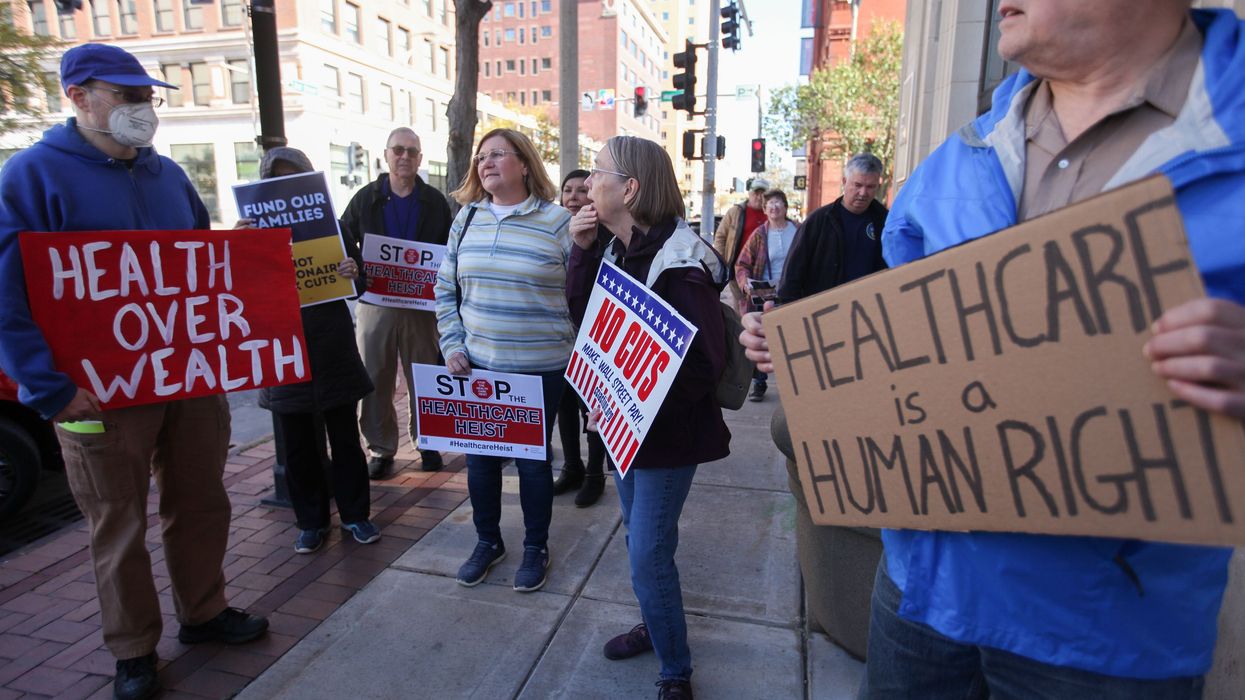"If you had a check in the mail, you could buy the insurance you thought was best for you," Oz stated without explaining in what way that is different from people who received tax credits to purchase plans on the insurance exchanges established by the Affordable Care Act signed into law by former President Barack Obama.
Pushing such empty ideas while claiming them as viable solutions to soaring costs is partly what led critics like Sen. Patty Murray (D-Wash.) this week to issue a public service announcement which stated flatly: "There is no Republican health care plan"—despite repeated claims to the contrary by GOP lawmakers, including Speaker of the House Mike Johnson (R-La.).
"Dr. Oz a few years ago was pitching Medicare Advantage for All—a scheme to put every person on the corporate health insurance plans he used to sell," said Andrew Perez, a politics editor for Zeteo, in response to the interview. "Now, he’s saying let’s take away insurance from millions and give them a few bucks for their health care instead. Insane."
In a blog post published last week, Nicole Rapfogel, a senior policy analyst with the Center on Budget and Policy Priorities (CBPP), a nonpartisan policy think tank, explained why expanded HSAs, backed by the government or otherwise, would do little to nothing to improve access or lower costs for healthcare.
"Expanding HSAs has been a consistent theme, including in the House-passed version of the Republican megabill, though those provisions didn’t pass the Senate," explained Rapfogel. "But these policies are misguided and would do little to preserve access to affordable, comprehensive coverage."
She further explains that HSAs generally are better for wealthier people who have spare income to direct into such accounts, but of little use to poorer Americans who are already struggling to make ends meet each month. According to Rapfogel:
Most people do not have spare cash to set aside in HSAs; an estimated 4 in 10 people are in debt due to medical and dental bills.
People in lower tax brackets also benefit less from HSA tax savings. For example, a married couple making $800,000 saves 37 cents for each dollar contributed to an HSA, more than three times the 12 cents per dollar a married couple making $30,000 would save.
Further, HSAs do not promote efficient use of health care services. Research has shown that HSAs do not reduce health care spending, but rather shield more of that spending from taxes.
Given that understanding of the well-known limitations of HSAs or other avenues of government backstopping of private insurance, the level of bullshitting or straight up ignorance by Oz on Sunday morning, for many, was hard to take.
It's "pretty amazing," said economist Dean Baker on Sunday, "that Dr. Oz doesn't know that people choose their insurance under Obamacare, but no one ever said Dr. Oz knew anything about healthcare."
In an interview with Newsmax earlier this month, Johnson—who has argued that the GOP has reams of policy proposals on the topic—accused Democrats of having no reform solutions to the nation's healthcare crisis other than permanently fighting to save the status quo, including the "subsidizing the insurance companies" which is at the heart of the Affordable Care Act.
Taxpayer subsidies for private insurance giants "is not the solution," Johnson admitted at the time, though his party has refused to offer anything resembling a departure from the for-profit model which experts have demonstrated is the central flaw in the US healthcare system, one that spends more money per capita than any other developed nation but with the worst outcomes.
Meanwhile, as Republicans show in word and deed that they have nothing to offer people concerned about healthcare premiums in the nation's for-profit system, only a relative handful of Democratic Party members have matched renewed focus on the nation's long-simmering healthcare crisis with the popular solution that experts and economists have long favored: a single-payer system now commonly known as Medicare for All.
Sen. Bernie Sanders, the Independent from Vermont who caucuses with the Senate Democrats, made the demand for Medicare for All a cornerpost of his two presidential campaigns, first in 2016 and then again in 2020. On the heals of those campaigns, which put the demand for a universal healthcare system before voters in a serious way for the first time in several generations, a growing number of lawmakers in Congress embraced the idea even as the party's establishment leadership treated the idea as toxic.
While a 2018 study by the Political Economy Research Institute (PERI) at the University of Massachusetts at Amherst detailed why it is "easy to pay for something that costs less," people in the United States exposed to the arguments of Medicare for All over the last decade a majority have shown their desire for such a system in poll after poll after poll.
A single-payer system like Medicare for All would nullify the need for private, for-profit insurance plans and the billions of dollars in spending they waste each year in the form of profits, outrageous pay packages for executives, marketing budgets, and administrative inefficiences.
Despite its popularity and the opportunity it presents to show the working class that the Democratic Party is willing to turn its back on corporate interests by putting the healthcare needs of individuals and families first, the party leadership continues to hold back its support.
Lawmakers like Rep. Ro Khanna (D-Calif.), who served as national co-chair to Sanders' second presidential run, has been arguing in recent weeks, amid the government shutdown fight, that Democrats should be "screaming" their support for universal healthcare "from the rooftops" in order to seize on a moment in which voters from across the political spectrum are more atuned than usual to the pervasive and fundamental failures of the for-profit system.
Rep. Pramila Jayapal (D-Wash.), lead sponsor of the Medicare for All Act in the US House, on Thursday reiterated her support for universal coverage by saying, "Instead of raising premiums for millions, how about we just get rid of them? Medicare for All!!"
As former Ohio state senator and progressive organizer Nina Turner said on Saturday, "This is a moment to mobilize for Medicare for All."
Dr. Abdul El-Sayed, another former Sanders surrogate now running for the Democratic nomination in Michigan's US Senate race, has been another outspoken champion of Medicare for All in recent weeks.
"While MAGA slowly suffocates our healthcare system, we’re watching corporate health insurance choose profits—and corporate Democrats capitulating," El-Sayed said last week, expressing frustration over how the shutdown fight came to end. "Who suffers? The rest of us. It’s time for a healthcare system that doesn’t leave our insurance in the hands of big corporations—but guarantees health insurance for all of us."
Following Dr. Oz's remarks on Sunday, El-Sayed rebuked the top cabinet official as emblematic of the entire healthcare charade being perpetrated by the Republican Party under President Donald Trump.
"They think we're dumb," said El-Sayed of Oz's convoluted explanation of direct payments. "They know that no check they send will cover even a month of the healthcare Trump bump we can’t afford—but they think we’re not smart enough to know the difference. Healthcare is becoming unsustainable under Trump. Medicare for All would fix it."
In Maine on Sunday, another Democratic candidate running for the US Senate, Graham Platner, also championed the solution of Medicare for All.
After watching Oz's peformance on CNN, Tyler Evans, creative director who works for Rep. Alexandria Ocasio-Cortez (D-N.Y.) declared in a social media post: "If we had Medicare for All, you could simply go to the doctor."




